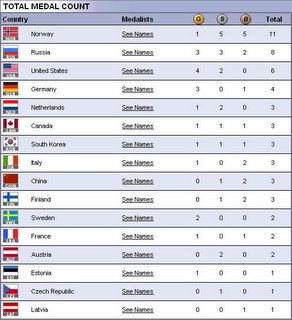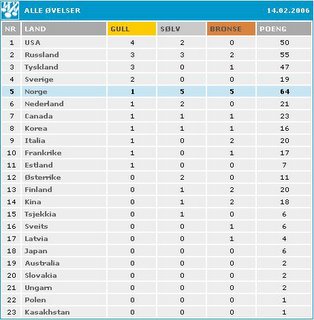
Meanwhile Norwegian media (NRK, the Norwegian version of the BBC) puts the US on top:

Then again, some purists think the recently added tv-friendly judged events,
Judged events, which hardly merit the appellation “sports,” are the bane of right-thinking viewers everywhere, but are manna to the non-sports fans whom NBC must court in order to justify charging the exorbitant advertising fees necessary to recoup the 3.57 billion dollars it spent for the right to televise the Olympics until 2008. The credulity and general lack of any interest whatsoever in the minutiae of competition, which characterize this audience, are also responsible for such reportorial abominations as tape delayed broadcasts, commercial breaks during live play of hockey games, interminable chatter throughout actual competition and time-wasting human interest stories between them, when NBC could be showing less popular but live events.which are dominated by Americans,
Of the 71 medals the U.S. won in the last four Winter Games, 31 came in events that were not in the Olympics before 1992 and in skeleton. Team USA's 2002 Olympic medals included 16 won in events that never had been Olympic sports until 1992 or later and in skeleton.should be removed.
1. Immediately cap the number of events at the present level and forget about adding any new ones. There must be no further nonsense about adding any more non-sports to the Games. Ballroom dancers, ski ballerinas, I’m looking at you. Events included in previous Olympics, but currently out of favor, are exempt from this provision (more on them later).I agree but I don't care all that much. I stopped watching the Olympics after I moved to the US. American TV turns it into infotainment with human interest stories and commentators who don't know the first thing about the sport. Growing up in Norway I would sit there with a stop-watch and write down lap-times on a piece of paper. NRK would show the entire event, all contenders, with no commercials. Maybe some day I'll get back into it; if digital TV takes off and I can watch NRK in Atlanta.
2. Integrate as many events as possible. Until Atlanta, in 1996, ladies competed against gentlemen in the shooting events; now they compete separately. No more. Shooting, curling, and archery should henceforth join equestrian events as co-ed sports.
3. Events requiring the participation of large teams should be kept to a minimum. One way to eliminate some of these events would be to require the participation of the best athletes in the world in order for the sport to be included in the Olympics. Immediately, dropping baseball and soccer (which is really a modified Under-23 tourney) would pare several hundred athletes from the Summer Games roster. The Olympics is no place for merely good athletes; it is for the very best of the very best. The passing into history of the noble ideal of the gentleman amateur is a deplorable matter, but now that the best athletes in the world have chosen to sacrifice that ideal on the altar of Mammon, the Games has chosen to accommodate them rather than to disavow its claim to be the ultimate athletic competition. A corollary of this decision, which cannot be gainsaid, is that there is no place in the Olympic Games for any but the best athletes.
4. Sports with too many sub-events should be cut down to size. In 1932, there were four shooting events; today there are seventeen. Four is more than enough. The same goes for Sailing, where eleven classes could be profitably reduced to two or three. (This might be a tough sell to IOC President Jacques Rogge, a former Olympic yachtsman, but even he might sanction the elimination of boardsailing.) As a core sport, and essential to the Summer Olympics, Athletics (or Track and Field to Americans) should be spared this process of reduction.
5. Ideally, Gymnastics, Rhythmic Gymnastics, Figure Skating, Ice Dancing, Boxing, Diving, and all other similarly subjective events should be eliminated. This will never happen, of course, but I would settle for exscinding the subjective, judged components of Ski Jumping and Moguls. In the former event, the longest jump should win. Period. As in the long jump, style in ski jumping should be measured by the result of the jump, not vice versa. In moguls, the “tricks” make a mockery of what is otherwise a pure, downhill race.
6. There should be a return to pure sports. By pure, I mean athlete-determined (as opposed to judge-determined) events that rely on athletic ability or sporting skill rather than artistic merit. The level of fitness, strength and agility required in events like gymnastics and figure skating is truly admirable, but neither of these events is any more a sport than is ballet, which requires a similar combination of athleticism and artistry. An example of a laudable recent addition to the Games is triathlon, which debuted in Sydney and should be a regular event in future Summer Games. For more such pure events, the IOC would do well to look to the history of the Games. Tug-o-war (included six times between 1900 and 1920) seems an obvious and potentially riotously successful candidate for re-inclusion. Pigeon shoots and Polo would also make lively additions to the Summer Games.

No comments:
Post a Comment